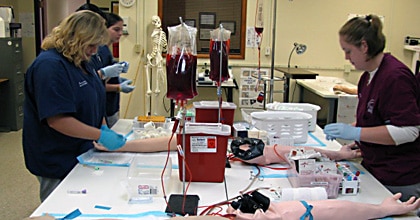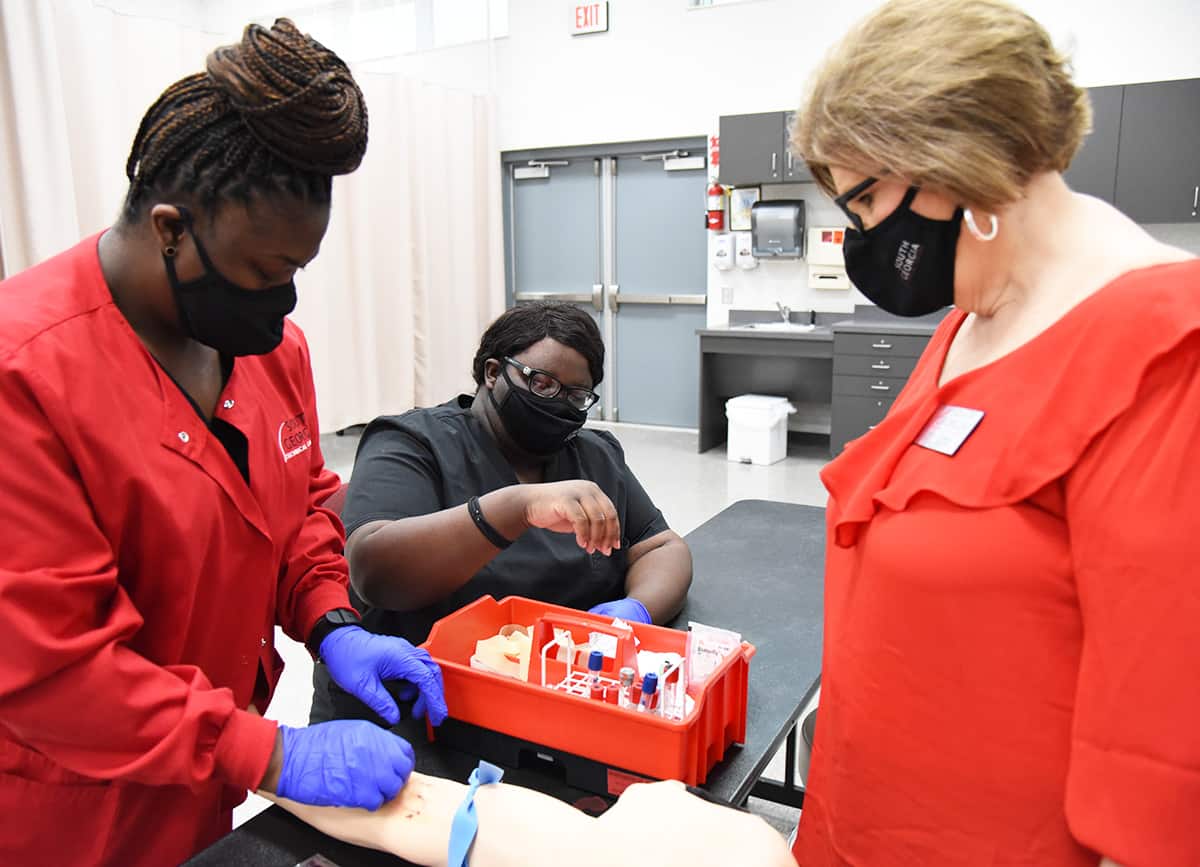Phlebotomy school Success: How to Thrive
Phlebotomy school Success: How to Thrive
Blog Article
The Path to Accreditation: Recognizing the Phlebotomy Educating Training Course Trip and Its Relevance
As you take into consideration the course to accreditation in phlebotomy, it's essential to comprehend the duty you'll play in healthcare. Your training will cover important abilities, from blood collection methods to patient interaction.

The Role of Phlebotomists in Health Care
Phlebotomists play a crucial duty in the health care system, working as the essential web link between individuals and vital analysis screening. You'll perform blood attracts, making sure samples are accumulated precisely and securely. Your experience aids in identifying medical problems, monitoring health and wellness, and assisting therapy choices.
In your day-to-day communications, you'll need to establish trust fund with individuals, making them really feel comfy during what could be a difficult experience. You're responsible for labeling and managing examples thoroughly to protect against contamination or errors, which might affect test outcomes.
Beyond this, you'll often work alongside doctors and nurses, communicating important info concerning clients' conditions. Your role is essential in preserving the process in healthcare setups, ensuring prompt and accurate outcomes. By understanding your skills, you contribute meaningfully to patient treatment, making you an important component of the medical group. Welcoming this obligation is vital to your success as a phlebotomist.
Overview of Phlebotomy Training Programs
When checking out phlebotomy training programs, you'll locate different kinds made to fit various timetables and discovering styles. Each program helps you develop vital abilities like blood collection and individual interaction. Recognizing these alternatives is vital to selecting the right path for your career.
Kinds of Educating Programs
Numerous types of training programs are offered for those wanting to come to be competent in phlebotomy. You can pick from certification programs, which normally last a couple of months and concentrate on crucial abilities. There are also diploma programs that supply a more thorough education and learning, typically lasting as much as a year. If you're seeking a much deeper understanding, an associate degree in a relevant area may be the ideal fit. Online programs offer adaptability for those balancing job or household dedications, allowing you to examine at your very own speed. In addition, some hospitals and centers use on-the-job training programs, offering functional experience while you discover. Whatever course you pick, each program intends to equip you with the necessary skills for an effective phlebotomy career.

Trick Abilities Created
Grasping phlebotomy requires a collection of essential abilities that are developed through thorough training programs. Furthermore, communication abilities are fundamental; you'll require to communicate with people, discuss treatments, and put them at convenience. Each of these abilities is important for your success as a qualified phlebotomist, making you an important property in any medical care setting.
Trick Components of a Phlebotomy Training Course
In a phlebotomy course, you'll focus on necessary topics that prepared for your future career. You'll participate in hands-on training that permits you to apply what you have actually found out in real-world settings. Both the curriculum and useful experience are vital for your success as a phlebotomist.
Curriculum Overview
While pursuing a phlebotomy training program, you'll encounter a curriculum created to furnish you with essential abilities and expertise. Phlebotomy Training Course. This educational program typically includes composition and physiology, concentrating on the blood circulation system and understanding blood components. You'll likewise learn more about various kinds of blood collection methods, consisting of venipuncture and capillary slit techniques
Furthermore, infection control and safety methods are essential parts, guaranteeing you understand how to keep a sterilized atmosphere. You'll study patient communication, stressing communication and empathy, which are critical for reducing individual stress and anxiety.
Hands-On Training Experience
Getting hands-on experience is a crucial component of your phlebotomy training program. This practical training enables you to apply what you've discovered in a real-world setting, improving your abilities and self-confidence. Phlebotomy school.
Additionally, you'll get the opportunity to communicate with people, which is important for creating your communication skills. This mix of technological proficiency and social abilities is crucial for your success as a qualified phlebotomist. Inevitably, hands-on training is where theory satisfies technique, strengthening your knowledge and readiness for qualification.
Certification and Licensing Demands
Prior to you can begin your career in phlebotomy, it is crucial to understand the certification and licensing requirements that vary by state. A lot of states require phlebotomists to hold an accreditation from an identified company, such as the National Phlebotomy Association or the American Society for Medical Pathology. These accreditations normally entail passing a test that tests your knowledge and abilities in the field.
In addition to accreditation, some states have particular licensing demands. You may need to complete a specific number of hours in medical practice, submit evidence of training, or undertake a history check. It is essential to investigate your dig this state's guidelines to make certain you satisfy all required requirements.
Staying informed about these needs not just assists you protect a setting but also enhances your trustworthiness as an expert. By satisfying these requirements, you'll be well on your way to an effective profession in phlebotomy.
Hands-On Training and Practical Experience
Hands-on training and useful experience are important components of your phlebotomy education and learning, as click resources they permit you to apply theoretical expertise in real-world circumstances. During your training, you'll take part in supervised venipuncture, learn appropriate techniques, and come to be aware of various blood collection equipment. This straight involvement is crucial for constructing your self-confidence and developing your abilities.
You'll work very closely with knowledgeable professionals that can lead you with the nuances of individual interaction and example handling. Each session not just strengthens your understanding however also prepares you for the busy atmosphere of medical care settings.
In addition, lots of programs incorporate scientific rotations, permitting you to experience diverse setups, from medical facilities to outpatient centers. This direct exposure assists you adapt to various challenges and person requirements, guaranteeing you're well-prepared for your future role. Accept these opportunities, as they're necessary to ending up being a skilled and caring phlebotomist.
Challenges Dealt With Throughout Training
While gaining hands-on experience is necessary, it is essential to acknowledge the obstacles that can arise throughout your phlebotomy training. You may come across stress and anxiety when doing treatments on actual individuals, particularly if you're new to the environment. The stress to obtain everything right can be frustrating. Furthermore, grasping the skills required for blood draws takes method; you may fight with technique originally.
Time management can also be a hurdle, as balancing concept, practical sessions, and personal commitments can feel challenging. You may face varying learning paces among your peers, leading to feelings of self-doubt if you believe you're falling back. Lastly, adapting to the different personalities of instructors can be tough, as each might have an one-of-a-kind mentor my website style.
Identifying these challenges beforehand can prepare you for success and assist you establish durability throughout your training journey.
Career Opportunities After Qualification

As you gain experience, you may also consider concentrating on areas like pediatric or geriatric phlebotomy, dealing with particular patient needs. Some phlebotomists choose to advance their jobs by becoming lab technicians or going after more education in healthcare fields.
In addition, your certification can lead to functions in training or managing new phlebotomists, allowing you to share your understanding. With the medical care sector constantly growing, your skills will certainly constantly remain in need, leading the way for a secure and fulfilling career. Accept the chances waiting on you!
Regularly Asked Inquiries
What Is the Typical Duration of a Phlebotomy Training Course?
Phlebotomy training courses commonly last around four to eight weeks. You'll take part in hands-on technique, classroom direction, and on-line understanding. Finishing this training prepares you for qualification and a rewarding career in healthcare.
Are Online Phlebotomy Courses Available?
Yes, online phlebotomy training courses are readily available. They provide adaptability and benefit, allowing you to examine at your own speed. Just verify the program is approved to satisfy accreditation demands and acquire important skills for your career.
How Much Does Phlebotomy Training Typically Cost?
Phlebotomy training typically sets you back in between $700 and $2,500, relying on the program and area. You must think about elements like course size, included materials, and hands-on experience when picking the ideal training for you.
What Are Common Requirements for Phlebotomy Training?
Usual requirements for phlebotomy training frequently consist of a secondary school diploma or GED, booster shots, and a background check. Some programs might also call for basic medical care understanding or qualifications, ensuring you're planned for hands-on training.
Can I Function While Completing My Phlebotomy Training?
Yes, you can work while finishing your phlebotomy training. Numerous pupils balance tasks with their researches, but ensure to manage your time successfully to guarantee you satisfy both job and training dedications successfully.
Report this page